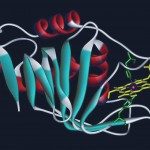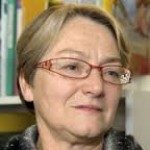Lien vers Pubmed [PMID] – 7074052
Biochemistry 1982 Mar;21(5):1098-103
The individual rates of solvent exchange of the six tryptophan indole NH hydrogens of lysozyme in 2H2O have been measured over a wide range of temperatures by using 1H NMR. Two distinct mechanisms for exchange have been identified, one characterized by a high activation energy and the other by a much lower activation energy. The high-energy process has been shown to be associated directly with the cooperative thermal unfolding of the protein and is the dominant mechanism for exchange of the most slowly exchanging hydrogen even 15 degrees C below the denaturation temperature. Rate constants and activation for the folding and unfolding reactions were obtained from the experimental exchange rates. At low temperatures, a lower activation energy mechanism is dominant for all hydrogens, and this can be associated with local fluctuations in the protein structure which allows access of solvent. The relative exchange rates and activation energies can only qualitatively be related to the different environments of the residues in the crystal structure. There is provisional evidence that a mechanism intermediate between these two extremes may be significant for some hydrogens under restricted conditions.

